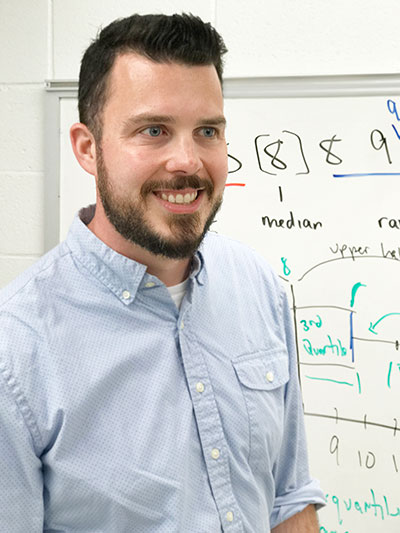Why Do I Teach?
- Jun 5, 2018
- Benjamin Rudolph, 2017 Distinguished Teacher of the Year

I teach because I really never loved school. I was curious and smart, but some might say I lacked self-control. I needed to be engaged; I was not the kind of kid who could sit still and absorb information. I knew from an early age that I wanted to be a teacher and make school fun for kids like me. I try to create lessons that allow students to learn content through authentic, hands-on experiences.
Over the years, that philosophy evolved into the creation of a student-centered, inquiry-based approach to teaching. For too long students have been taught to be amazing direction followers. The experiences they have, especially in science, do not allow for enough independent problem finding and solving. Students are traditionally told what the problem is and then given step-by-step instructions on how to solve it. That is not how the real world works. My philosophy is to inspire students to not only ask questions but to have the resiliency and, more importantly, the desire to seek their answers.
What I realized is that it is not the grade I got on a test or the worksheet I completed that really shaped my education. The experiences that had a lasting impact were the activities that were driven by curiosity and discovery, such as when I was in grad school and learned how to teach buoyancy. I was given a small piece of clay and told to make it float and be able to hold some weight. Immediately we started shaping the clay, turning our ideas into creations. We put the clay in the water and watched what happened. We observed, reflected, and improved. We went through the engineering cycle without even knowing it! No one wanted to stop when the professor said to wrap it up; it was like we were all children. We whined that we had one more idea to try or that if we had only a few more minutes we could make our boats perfect. Then he asked us to reflect on what we observed and explained how, without knowing, we had learned not only about how things float but how to experiment, observe, and improve. A simple activity like this had me completely engaged and forced me to fail and try again. It was then that I realized that I had to provide meaningful experiences like this for my students.
Currently, I am working with Victoria Winokur and the Guilderland Central School District in New York to develop a program that encourages all students to participate in higher-level experiences focused on STEAM (science, technology, engineering, the arts, and mathematics). We are creating lessons that are accessible for all learners. Students use curiosity, creativity, and collaboration to solve problems and design products to meet the desired objective. We focus on resilience and perseverance as the keys to continually improving. We teach kids that “failures” are nothing more than opportunities to get better. Our objective is for students to learn how to reflect on their experiences and know that as long as they keep trying they will keep improving.
The C3 (Curiosity, Creativity, Collaboration) lessons we employ give students confidence in their ability to solve problems and achieve their goals. For some students who struggle with traditional instruction, these opportunities create an environment where they can showcase their skills and have their ideas valued. Our lessons are engaging and show kids that learning can be fun and enriching at the same time. Teaching is not just about getting students to master content; it is about creating individuals who will be prepared to solve the problems of tomorrow.
Humans are designed to be curious and ask questions, and seeking their answers is learning. Learning is a process, not a destination; students succeed when they can learn to value the act of learning and not necessarily the results. For too long educational success has been determined on how well someone can perform on a summative assessment, but that does not account for progress, how much an individual has improved. It places emphasis on memorizing facts and regurgitating them on a bubble sheet. We need to remember that learning comes from the multiple attempts, from the failures and from the successes. It comes from being resilient, reflective, and knowing that no matter how many times we fail, we are constantly getting better. Learning happens when we can work together to solve a problem. It is not just being able to remember information but being able to acquire and use that information that truly determines an individual’s genius.
Benjamin Rudolph teaches in the CCC Program at Guilderland Central School District in New York. Contact him at rudolphb@guilderlandschools.net. Follow him on Twitter @MrRudolphCCC.